|
|
|
Sort Order |
|
|
|
Items / Page
|
|
|
|
|
|
|
| Srl | Item |
| 1 |
ID:
159391


|
|
|
|
|
| Summary/Abstract |
The literary corpus of the sixteenth-century North Indian bhakti poet-saint Mirabai has grown over time as devotees have used (and continue to use) her name, life story and first-person voice in poems. Drawing on hagiographies, written and oral poems, printed collections and performative engagements with Mira, I argue that these moments of autobiographical ‘posing’ reveal autobiography as powerful for speaking about religious transformation, in particular the issues of authority, experience and critique. Furthermore, the centrality of autobiographical speech in the tradition is linked to an increasing emphasis on Mira as a figure of religious transformation, and bhakti itself as a transformative path.
|
|
|
|
|
|
|
|
|
|
|
|
|
|
|
|
| 2 |
ID:
159383
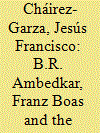

|
|
|
|
|
| Summary/Abstract |
This paper analyses Ambedkar's challenge to racial theories of untouchability. It examines how Franz Boas’ ideas about race, via Alexander Goldenweiser, influenced Ambedkar's political thought. Ambedkar is situated as a thinker aware of larger changes taking place in Western academia in the early twentieth century. During his time at Columbia University, Ambedkar familiarised himself with ideas that rejected the fixity of identities and racial hierarchies; following Boas, he rejected the idea that the untouchables’ place in society was determined by their supposed racial inferiority. Instead, he argued that untouchability was a cultural problem that could be stamped out.
|
|
|
|
|
|
|
|
|
|
|
|
|
|
|
|
| 3 |
ID:
159390
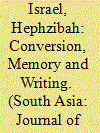

|
|
|
|
|
| Summary/Abstract |
Examining autobiographical statements left by South Asians converting to Christianity from the nineteenth century onwards, this article investigates the function of memory and literary narrative in three features common to several accounts: the translation of conversion accounts; the reconstruction of past events through narrative devices; and the re-formation of the Protestant individual conceived as part of a larger project of ‘reforming’ India as a state of progressive modernity. It argues that personal memory is inflected by conventions of writing about conversion, pressing into service specific tropes to exhibit the convert as ‘Protestant’. This economy of recall allowed converts to participate in wider public debates on religious and social reform by re-enacting conversion and confession in autobiography.
|
|
|
|
|
|
|
|
|
|
|
|
|
|
|
|
| 4 |
ID:
159386
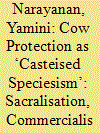

|
|
|
|
|
| Summary/Abstract |
Offering a more-than-human sociological analysis of cow protectionism in India, this article argues that the discourse renders bovines vulnerable because it reinforces two compatible and comparable oppressions: ‘casteism’ and ‘speciesism’. It privileges upper-caste Hindu nationalists whose identity politics are intertwined with sacralising native cows and their milk, producing ‘casteised speciesism’. Through interviews with experts engaged in cow protection, the article demonstrates that native Indian breeds are burdened with representing Hindu purity, while buffalo and crossbred or Jersey cows are exposed to exploitation and oppression comparable to the situation faced by Dalits. To be meaningful for the animals, protectionism needs to be embedded in an animal rights movement that employs vulnerabilities as a framework to deconstruct the oppression of non-humans.
|
|
|
|
|
|
|
|
|
|
|
|
|
|
|
|
| 5 |
ID:
159394
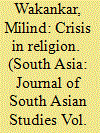

|
|
|
|
|
| Summary/Abstract |
The essay tries to understand how conversion to Christianity can transform language and its rhetorical possibilities inwardly. In the case of Jyotirao Phule, who was not a convert but was a critic of caste distinctions in nineteenth-century Western India, this meant that Marathi could now be used to uncover the link between Hindu apologetics and Brahmanism. Here I argue that the ‘humble’ Marathi used in missionary tracts made possible the emergence of the ‘I’ of the convert, and pushed ‘religion’ into the gap opened up in social life by a crisis of values, a crisis productively instrumentalised by Phule.
|
|
|
|
|
|
|
|
|
|
|
|
|
|
|
|
| 6 |
ID:
159384
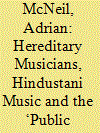

|
|
|
|
|
| Summary/Abstract |
In the late nineteenth century, Hindustani music and its culture arrived in Calcutta's public sphere. It was carried there as much through the migration and agency of the professional lives of the ‘ustads from the North’ as it was through the forces of coloniality, modernity and Hindu nationalism. On its arrival, the performance practice and social organisation of Hindustani music culture came face to face with the bustle of social and cultural experimentation and innovation that came to define the ‘Bengal Renaissance’. Hindustani music was certainly not isolated from this larger cultural dynamic and, over four or five decades, its practitioners were compelled to formulate a series of responses in order to negotiate the challenges which this public sphere posed to past practices of this tradition transplanted from North India to Bengal. Their responses bring into focus a number of significant issues: firstly, the nature of these responses and the consequences they had for the development of Hindustani music and its culture; secondly, the issue of the discourse of ‘modern’ Hindustani music that arose from this encounter; and thirdly, questions over whose voice(s) were represented and whose voice(s) were marginalised in the process. Finally, there is the issue of how these responses still resonate in Hindustani music practice today, as they continue to reside in and frame the contemporary musical imagination.
|
|
|
|
|
|
|
|
|
|
|
|
|
|
|
|
| 7 |
ID:
159392
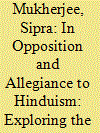

|
|
|
|
|
| Summary/Abstract |
The article studies the Bangla hagiography of Harichand Thakur, the founder of the Matua sampraday, a sect that broke away from Brahmanical Hinduism in nineteenth-century Bengal. The paper explores how the hagiography takes on the added task of constructing the collective identity of the Matuas. It argues that for a vulnerable and marginalised community where the hagiography is among the few books published, the text serves to validate the community's aspirations and authenticates its legacy. The sect, founded in opposition to the dominant Brahmanical hegemony that had kept them suppressed for generations, has been an upwardly mobile community in the twentieth century. The essay examines the changing presentations of the hagiography over a century to explore how the Matua community walks a fine line between opposition and allegiance to the majoritarian Hindu faith, and how the indeterminate boundaries between myth and history, fact and fiction, are used in this project of the community's self-construction.
|
|
|
|
|
|
|
|
|
|
|
|
|
|
|
|
| 8 |
ID:
159387
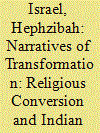

|
|
|
| 9 |
ID:
159382
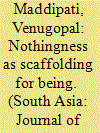

|
|
|
|
|
| Summary/Abstract |
This essay attempts to open up a conversation between M.K. Gandhi and contemporary ecological thought. Unlike ecologists, who think through the human and then reach for a wider post-human ecology, in the 1930s, Gandhi journeyed in the reverse order, arriving at an emphasis on human withdrawal into nothingness after initially thinking through the withdrawal into nothingness of an infinitely extended, non-human, celestial being. The essay explores Gandhi's emerging anthropocentric conception of the piety of nothingness in the context of a household plan designed for him in 1936–37 by Madeline Slade, in the village of Segaon in Maharashtra. The essay draws out the architectural and political entailments of Gandhi's anthropocentrism and his emphasis on varnashramadharma.
|
|
|
|
|
|
|
|
|
|
|
|
|
|
|
|
| 10 |
ID:
159393
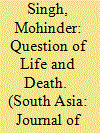

|
|
|
|
|
| Summary/Abstract |
This paper is based on a reading and an interpretation of Swami Shraddhanand's Hindi autobiography, published in 1924. In it, Shraddhanand centrally narrates the story of his conversion to the Arya Samaj and his self-transformation in the second half of the nineteenth century. Through a close reading of the conceptual terminology embedded in the text, the paper attempts to show that the conversion being narrated here cannot be understood by referring to the category of religion alone, and that the identity that the protagonist discovers for himself—his new Arya identity—is a composite civilisational-religious identity that involves transformed ideas of religion and religiosity.
|
|
|
|
|
|
|
|
|
|
|
|
|
|
|
|
| 11 |
ID:
159385
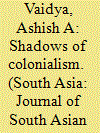

|
|
|
|
|
| Summary/Abstract |
This paper examines the status of tribal communities in central India through the lens of structural violence. In the process, a new and normatively grounded definition of violence is put forward which addresses weaknesses in the original definition proposed by Johan Galtung. The paper connects this new definition of structural violence to developmentalist and capitalist ideology, frameworks that benefit tribal communities by some empirical measures, but which must be recognised as profoundly violent in the normative contexts of those communities. Adivasis are caught between the competing imperatives of the Indian state's different and overlapping stages of modernist development: the remnants of the old colonial ‘civilising’ mission, a post-colonial nationalist industrialism and a post-industrial urge toward conservation. I argue that Galtung's definition is ill-suited to the task of describing this type of post-colonial structural violence, and that my definition solves this problem by accounting for the violence of conflicting normative frameworks.
|
|
|
|
|
|
|
|
|
|
|
|
|
|
|
|
| 12 |
ID:
159381
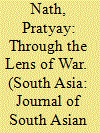

|
|
|
|
|
| Summary/Abstract |
The present article is a study of the process of Mughal empire-building in early modern North India using war as the point of entry. Specifically, it focuses on three sieges from the early years of Akbar's reign—Chitor (1567–68), Ranthambhor (1569) and Kalinjar (1569). It teases out certain aspects of these sieges and discusses them at length individually. Bypassing historiographically-popular themes like combat and technology, it explores less-probed issues such as the fate of defeated enemies, the involvement of zamindars and mansabdars, military finance and the role of quasi-military labour in imperial military campaigns. In the process, it strives to write a social, cultural and economic history of Mughal military expansion focused primarily on the second half of the sixteenth century.
|
|
|
|
|
|
|
|
|
|
|
|
|
|
|
|
| 13 |
ID:
159388
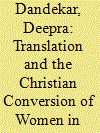

|
|
|
|
|
| Summary/Abstract |
This article foregrounds the interstitial and hybrid third voice of a nineteenth-century Christian convert in colonial India. Bala Shundoree Tagore, a Bengali woman and wife to the esteemed Gyanendra Mohan Tagore, was declared spiritually Christian by missionaries, even though she died before being baptised. Bala's narrative production by her biographers and translators obfuscated and transformed her voice, writing her into the history of Indian missions as a success story. Refashioned as a gendered symbol for Indian Christian women from the nineteenth century, Bala's narrative was utilised by missionaries by divesting her of the agency she possessed.
|
|
|
|
|
|
|
|
|
|
|
|
|
|
|
|
| 14 |
ID:
159389
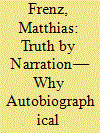

|
|
|
|
|
| Summary/Abstract |
This essay investigates the significance of autobiographical conversion narratives using a case study from the Basel Mission, active in India in the mid nineteenth century. I argue that such narratives are pivotal for the realisation of conversion in the discourse-oriented Protestant mission. Taking up Foucault's idea of ‘regimes of truth’, I understand autobiographical accounts of conversion as ‘acts of truth’. Such acts shape and contribute to a certain discourse formation that has a normative function for the individual and the community involved. The autobiographical conversion narrative thus not only reports events and experiences, it also brings an aura of authenticity and genuineness to the individual conversion, and it reinforces the validity of the norms expressed through the experiences of the subject for the community that subscribes to the discourse.
|
|
|
|
|
|
|
|
|
|
|
|
|
|
|
|
|
|
|
|
|